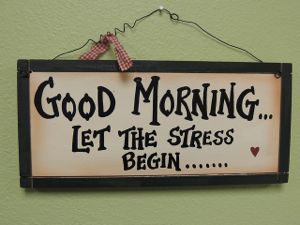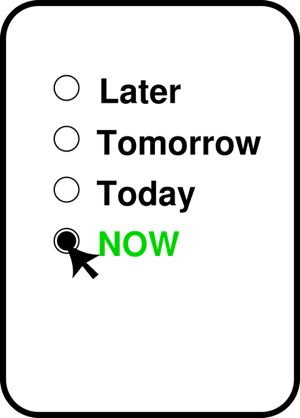You promised yourself you’d get chapter twenty-one done today.
But the day is gone and it didn’t happen.
Oh well. You’ll get to it tomorrow.
Tomorrow comes and goes and the chapter still isn’t done. No problem. The weekend is coming. You’ll get it done then.
We all tell ourselves things like this all the time. Problem is, these statements are often lies.
Especially if we fail to take action.
Often, we expect a door to magically open so we can find the time we’re looking for to do those things we want to do.
Meanwhile, we continue on, overwhelmed, stressed, fatigued, and failing to get the writing time we want.
Here are seven lies you may be telling yourself right now—and how to obliterate them from your mind so you can get more writing done.
 1. I don’t have time.
1. I don’t have time.
It’s easy to feel this way. Time so quickly gets away from us, especially in today’s world where we all feel pulled a thousand different directions.
This is a lie, though. We all have the same amount of time in a day. Besides, this excuse leaves us powerless. We certainly have no way to produce more time. All we can do is better manage the way we spend it.
Try to cut this phrase out of your language entirely. When you’re presented with something to do, rather than say “I don’t have time,” say, “I choose to spend my time on ___” and fill in the blank.
This simple shift can make a huge difference in how you spend your day. You’ll realize that you’re actually choosing to spend time on…perhaps things that aren’t that important to you.
This realization can help you reassess your priorities, so that you’re sure to make time for the ones that are top on your list.
 2. I’m getting a lot done.
2. I’m getting a lot done.
If “a lot” doesn’t include your writing—assuming your writing is important to you—then in reality, you’re not getting a lot done.
You’re just getting “stuff” done that or may not really matter in your life.
We tend to enjoy busywork because it takes less focus than creative work. Studies have actually shown that employees are happier when doing menial tasks like filing and answering emails because these tasks are easier. They take less mental energy.
And let’s face it, we all like to take it easy when we can.
But getting a lot of stuff done may not mean much in the long run. Ask yourself—if you continue to get everything done that you’re getting done now, but neglect other things (like you’re writing) that are more important to you, where will you be in five years?
If you don’t like the answer, shine the light on this lie, and realize that simply staying busy means little if your work isn’t helping you to grow or achieve your dreams.
 3. I work well under pressure.
3. I work well under pressure.
This may be true—for a while.
But eventually, everyone burns out. If you’re a workaholic (and you know who you are), realize that it will catch up with you.
Research shows that over the long run, workaholics are less productive than their more balanced colleagues. The body and mind need rest, exercise, a healthy diet, and time off to function at an optimal level.
We can all rise to the challenge when things get rough for a few weeks, maybe longer. (While finishing edits for a book, for example, or finalizing a draft, etc.) But don’t lie to yourself that you can manage an overload long-term. Something’s going to give, and unfortunately, it’s often your health.
Don’t take it that far. If you’re feeling under pressure for an extended amount of time, realize that it can hurt your ability to keep up—and even erode your creativity. Make a change before something happens that forces you to.
 4. I have to get everything done.
4. I have to get everything done.
This is a common lie we all get wrapped up in. We have so much to do. So many things on our lists. And we have to finish them all.
This is a lie. Usually there are several things on the list that we don’t really have to attend to right now.
It’s like looking at the grocery list during a lean month. You realize you don’t really have to have aluminum foil, or taco shells, or even chocolate chip cookies, if you can’t afford them.
Think of your time the same way. You have only so many hours in the day. That means you may not have the resources to get everything done that’s on your list. Be willing to prioritize, and cross some things off.
Having a long to-do list can also lead to a hodgepodge approach to time management. You want to cut down on the stuff you have to get done, so you start at the top simply to make some progress.
But that may mean you do the easier things first, so that by the time you get to the harder ones—sitting down to face the blank page, for example—you’ve run out of juice.
Rearrange your list. Put your three most important tasks on top—these are often the hardest ones, such as writing or tackling your new website. Leave the easier, miscellaneous things for later.
Most likely, you can do them when you’re a little tired. You may even be able to delegate them, or (gasp!) leave them undone. As long as you get to your main priorities, it won’t matter so much if some of the smaller things are carried over.
 5. I have to take work home.
5. I have to take work home.
It’s easy to believe this lie.
You may work for a company that rewards those people who are always on call, even though they’re not required to be.
But remember—studies show that workaholics are actually less productive than those who work normal hours. Studies have shown that after 50 hours, productivity takes a huge downward dive.
“The person who brings work home is less productive throughout the day,” says productivity consultant Tracey Foulkes, CEO of Get Organised South Africa. “Instead of being efficient while they’re working, they rely on the fact that they’re going to finish at home. As a result, they do everything slower.”
Bringing work home also tends to disrupt rest and recreation, which actually works against your creativity and productivity.
If you want to make more time in your day, make it a point to leave work on time as often as you can. Truly leave work—don’t do more of it after dinner at home.
You’ll not only have more time to write that way, but you’ll likely return to work refreshed and rested, which will help you get more done at a faster pace.
 6. I’ll do it when I have more time…
6. I’ll do it when I have more time…
This is a really dangerous one. We fool ourselves into believing that we will get to our writing, or to the other things we want to accomplish, just not today.
But then today becomes tomorrow, and the next day, and the next, and still we aren’t getting to it.
We promise ourselves we will, believing we have endless days to fulfill that promise.
Stop this lie in it tracks. It perpetuates a vicious cycle, luring us into believing that tomorrow, and tomorrow, and tomorrow we’ll get it done. It allows us to relax with a false sense of security, believing that things will magically change without us having to do anything.
Imagine a giant clock counting down the number of hours you have left to write. Say you have one hour a day to devote to your craft, times the number of days you’re likely to have left to live.
Every day that you neglect that hour and spend it on something else is a day you’ll never get back.
None of us knows how much time we have left. It’s dangerous to keep putting things off. Besides, if you’ve gotten into a routine that doesn’t regularly include your writing, that’s a habit you’ve formed that you’ve got to break, or you’ll just keep neglecting it.
If you didn’t get to it today, something needs to change. Now.
 7. It’s just my writing—it can wait.
7. It’s just my writing—it can wait.
Tell yourself this lie, and you’re giving yourself a dangerous message:
Your writing is not important.
We teach our brains how to respond by what actions we take. If we regularly let our writing (or other creative projects) fall by the wayside as we put our time and attention on other matters, we’re telling the subconscious that the writing isn’t all that important.
When we do that, we increase the odds that we won’t get to it the next day either, or the next. Why should we, if it’s not important?
On the other hand, if you make it a priority every day, by doing at least a little no matter what, you train your brain to put your writing higher up on the “things to do” list.
If this sounds a bit split personality, that’s okay—it’s absolutely true.
“By becoming more aware of what is happening and learning how to refocus your attention in healthier and productive ways whenever a deceptive brain message strikes,” says Rebecca Gladding, M.D., in Psychology Today, “you teach your brain new, beneficial responses.”
Teach your brain to do the important things first—by tackling them as early as you can in your day.
Don’t allow yourself to believe the lie that it can wait until tomorrow, because what that really means is that it may wait a lot longer than that, and ultimately, it may never get done at all.
If it’s important to you, it’s important enough to put at the top of your list. Don’t allow yourself to believe otherwise.
What lies do you tell yourself about how you’re managing your schedule?


PS–SO sorry about Morrigan. We really are never prepared. My heart is with you . . .
Thank you so much!!
Busted here, Colleen. I’ve been fierce about putting my writing first. But then . . . I took on a rush editing job, for a major publisher, and everything went out the window.
You’ve just kicked my butt to go back to my number-one priority–writing.
Though my backside is stinging a bit, thank you 🙂
I know exactly how that goes, Susan. Sometimes those rush jobs just throw everything out of whack! Good luck getting back in gear. Ha ha. A standing desk for a few hours perhaps? ;o)
This message hit me hard as I tend to put off my writing in order to accomplish the “urgent” that amounts to tasks I can do whenever it’s convenient. I want to make my writing a top priority and not put it on the “back burner” with empty promises of doing it when I have found some time. I need to sit down and make my time count. Who knows what tomorrow will bring and if God forbid I die in a freak accident, my words will wither and my work goes to dust. Thanks for this kick in the pants so I can get my writing done and get the creative juices flowing!
Wow, what a great, honest comment, Kathy. I’m pulling for you to put your writing first!